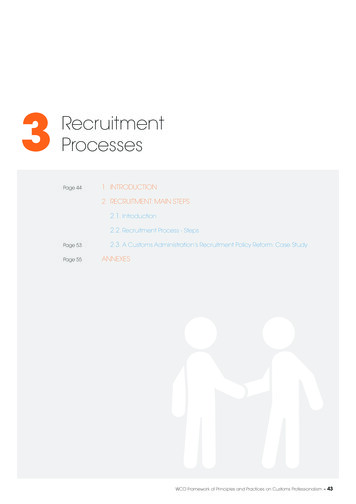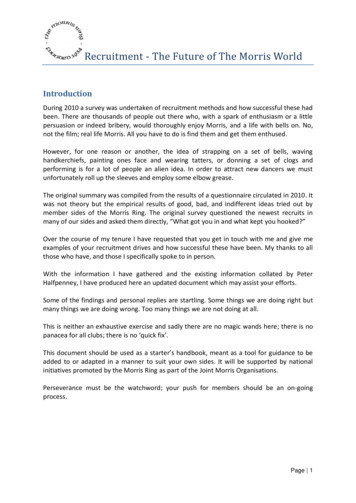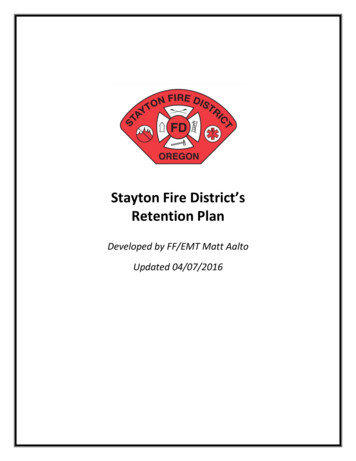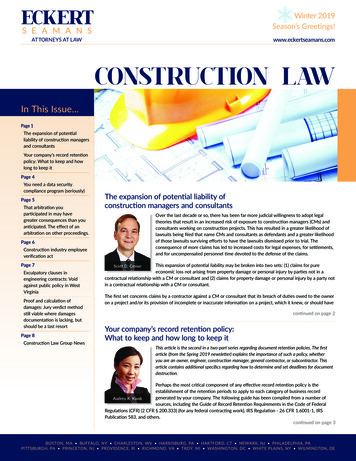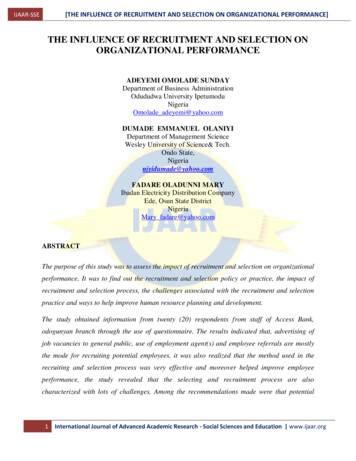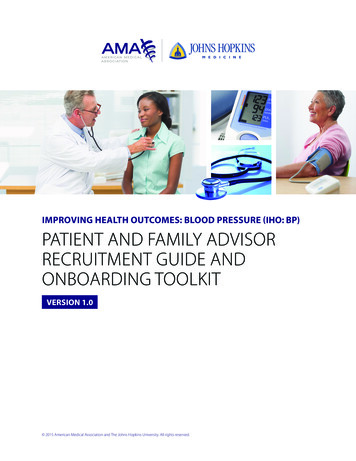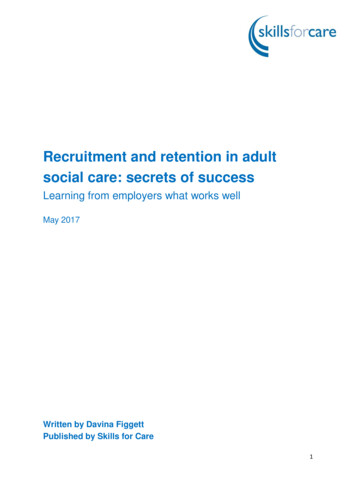
Transcription
Recruitment and retention in adultsocial care: secrets of successLearning from employers what works wellMay 2017Written by Davina FiggettPublished by Skills for Care1
Recruitment and retention in adult social care: secrets to success. Learning from employerswhat works wellPublished by Skills for Care, West Gate, 6 Grace Street, Leeds LS1 2RP www.skillsforcare.org.uk Skills for Care 2017Reference no. 160177ACopies of this work may be made for non-commercial distribution to aid social care workforcedevelopment. Any other copying requires the permission of Skills for Care.Skills for Care is the employer-led strategic body for workforce development in social care for adults inEngland. It is part of the sector skills council, Skills for Care and Development.This work was researched and compiled by Davina Figgett of Skills for Care.2Skills for Care, Recruitment and retention in adult social care: secrets of success
Table of contentsTable of contents. 3Acknowledgements. 4Executive summary. 51. Introduction . 112. Overview of research methods. 122.1About the surveys . 122.2About the research strategy . 132.3About the respondents . 143. Key findings from the research . 173.1Attracting more people . 173.2Taking on the right people. 243.3Developing talent and skills . 313.4Keeping your people . 343.5Recruitment circumstances . 414. Key findings from the research with individual employers . 494.1Recruiting personal assistants . 494.2Skills and experience . 534.3Retaining personal assistants . 545. Conclusions and recommendations . 575.1Conclusions . 575.2Recommendations . 586. Appendix . 606.1 Analysis of questions only asked of ‘Parent’ and Local Authority respondents in theonline employer survey . 603Skills for Care, Recruitment and retention in adult social care: secrets of success
AcknowledgementsWe are thankful to the following people and organisations who freely gave their timeto contribute to the development and execution of this research. Skills for Care’s recruitment and retention matrix group (membership of whichis drawn from across the organisation) for reviewing drafts of the survey tools. Skills for Care’s workforce intelligence team for producing and managing thesample and mailing and for co-ordinating the work with individual employers. Colleagues from the Department of Health for reviewing drafts of the surveytools. The research group at the Association for Directors of Social Services(ADASS) for reviewing and approving the fieldwork amongst Local Authorityemployers. All of the social care employers who completed the survey for their time andinsights into what works in relation to recruitment and retention. The Penderels Trust and My Life for distributing surveys to individualemployers on our behalf and to all of the individuals who shared theirexperiences of employing personal assistants.4Skills for Care, Recruitment and retention in adult social care: secrets of success
Executive summaryIntroductionWe know that there is a real and enduring challenge for employers within the sectorto recruit, develop and retain the right people to deliver high quality, person-centredcare and support services. We are also aware that there is no single solution to thischallenge, especially given the wide variation in recruitment and retentioncircumstances across the country.We therefore decided to conduct a piece of research amongst adult social careemployers with a turnover of less than 10% to explore what it is that they do thatthey feel contributes to their success in relation to recruitment and retention. Tocompliment this we conducted research amongst individual employers to exploretheir experiences of recruitment and retention.Our hope is that by disseminating their ideas on good practice others can learnfrom the experiences and that we can use the information to shape our futureresources.Adult social care employersOur research amongst employers with low staff turnover rates found that the thingsthat make a difference do not necessarily cost organisations more but can have apositive impact on potential candidates and existing employees. Furthermore, thereis evidence to suggest that staff turnover is an influencing factor in organisationsobtaining favourable ratings from the Care Quality Commission (CQC).A) Attracting more peopleAttracting the right people, with the right values, behaviours and attitudes towork in adult social care is vital.“When recruiting we have in our minds ‘would we like them to look after ourfamily member?’”(Foxglove Care Limited, Residential care provider)Employers told us that: you need to have a good understanding of local needs andcircumstances to underpin your recruitment planning process; thisenables you to be proactive and strategic, rather than reactive5Skills for Care, Recruitment and retention in adult social care: secrets of success
it’s important to pay above the National Living Wage, but also to sell thewider benefits of working in adult social care; employees value goodworking conditions, especially flexibilitydeveloping a positive organisational culture, where staff are supportedand valued and have opportunities to enhance their skills and knowledgereinforces the message that working in adult social care can be a goodcareer choicebuilding a strong reputation for being a good employer means thatexisting staff will spread the word and will attract like-minded people, that‘fit’ the organisations values to apply for your vacanciesbeing honest about the realities of the job saves time for both potentialjob applicants and organisations and helps ensure a good match withthe organisation’s ethos and values and the people who need care andsupport.“You need to offer a competitive pay rates, good working conditions,training and development.”(Greek and Greek Cypriot Community of Enfield, Domiciliary care provider)B) Taking on the right peopleHaving attracted the right people to apply for your vacancies it is important toselect and employ the best people for the jobs.“Don't just fill the vacancies. Fill them with the right people.”(Claxton House, Atlanta Healthcare, Residential care provider)Employers told us that: finding staff with the right values and behaviours is more important thanfinding staff who are already qualified; skills can be taught but personalattributes (kindness, compassion, reliability, honesty, etc.) cannot life experience and a willingness to learn can be more desirable thanprevious work experience (reflecting the principles of values basedrecruitment) inviting candidates for ‘taster shifts’ and involving people who need careand support and their families (or friends and advocates) in therecruitment process helps you to establish whether candidates ‘walk thetalk’ you need to take a multi-pronged approach to communicating thevalues, behaviours and attitudes you look for in staff so that candidatesare clear about whether the role is right for them6Skills for Care, Recruitment and retention in adult social care: secrets of success
values based interviews enable you to explore whether candidates will‘fit’ your organisational needs.“Spending time with the candidate at the beginning of the process will paydividends later on. Informal interviews allow you to select / deselectcandidates from the process at an early stage.”(Orchard Vale Trust, Residential care provider)C) Developing talent and skillsOnce the right people have been recruited the priority is to ensure that theystay and grow with you.“Treat employees as the key to the business –invest in them and involve them in the direction of the business.”(Step-A-Side, ‘Other’1 provider)Employers told us that: investing in staff should not be a tick box exercise; find out what theyneed and then explore the best way/s of addressing it there is funding available to help you support and develop your staff ifyou look for it (almost half had accessed Skills for Care’s WorkforceDevelopment Fund2 and a similar number had invested inapprenticeships) learning and development needs can be identified in many differentways, including through the induction process, regular structuredsupervision sessions, performance appraisals, performancedevelopment plans and reflections on practice as well as formal training, knowledge and skills can be developedthrough mentoring or buddying, bespoke schemes to support staff inspecific roles and through apprenticeships. Likewise, continuousprofessional development can be delivered through group knowledgetransfer sessions and professional development time it’s important to ensure that all staff understand and uphold the values ofyour organisation; by creating a positive and open environment staff aremore likely to thrive and grow.12Privately owned home care agencywww.skillsforcare.org.uk/WDF7Skills for Care, Recruitment and retention in adult social care: secrets of success
“Offer extensive training and support where and when it is needed. Less confidentstaff may need the support to get the best from them.”(DICE Healthcare Limited, Domiciliary care provider)D) Keeping your peopleRetaining good staff is especially important to organisations delivering adultsocial care as continuity of staff is crucial in delivering high quality care topeople who need care and support.“To be an 'outstanding' care provider [means providing] a secure happyenvironment where staff can be themselves and grow and develop.”(Chestnut Grove Rest House, Residential care provider)Employers told us that: respecting and valuing staff, investing in learning and development,embedding the organisation’s values and celebrating achievements allgo a long way to improving staff retention involving staff in decision making and paying above the local minimum(paying competitively) also ensure that staff feel valued for the work thatthey do, which in turn has a positive impact on retention rates it pays to be as flexible as possible when it comes to setting workinghours; different shift patterns suit different types of workers andemployers who can accommodate this are rewarded with more loyalstaff it’s important to support staff and to take into account theirresponsibilities outside of the workplace as these can affect performanceat work. Ensuring staff are physically and mentally fit for work goes handin hand with providing a positive workplace culture measuring staff satisfaction can be useful in identifying ways to furtherdevelop the culture of the organisation but whether this is done formallyor informally, the crucial part is to be seen to listen to and act upon whatstaff tell you.“Maintain high levels of staff motivation by supporting staff development,tackling performance issues, and developing a culture of shared ownershipover successes.”(Old Hastings House, Residential care provider)8Skills for Care, Recruitment and retention in adult social care: secrets of success
Useful resources from Skills for CareFinding and keeping workers has lots of practical resources themed underthe four sections ical support for your organisation is available if you’d like morebespoke help with your recruitment and ues and behaviours based recruitment toolkit has guidance andtemplates to help you recruit and retain people with the right sI Care Ambassadors is a great way to develop your existing staff and findnew staff by delivering careers activities in your local sThink Care Careers has information about working in social care, thedifferent job roles available and how you can progress in your career.www.skillsforcare.org.uk/thinkcarecareersA Question of Care – A career for you? is an interactive scenario basedquiz that helps potential candidates assess whether they have the rightvalues to work in social care.www.skillsforcare.org.uk/QofCareLearning and development is vital in delivering high quality care andsupport and we have resources to help.www.skillsforcare.org.uk/learning9Skills for Care, Recruitment and retention in adult social care: secrets of success
Individual employersSimilarly we’re aware of the challenges faced by those who directly employpersonal assistants (PAs), often called individual employers, to enable them to livetheir personal, social or professional lives according to their wishes and interests.Our research amongst this group of employers found, for many, employing peoplethat they know (friends, family, neighbours, or people known through school, workor the community) had been successful. However, where this was not possible ordesirable, then individual employers stressed the need to seek recommendationsand support from others to identify suitable candidates for the role.Getting recruitment right involves being very clear from the start about what the roleentails and then, for many, using your instincts to select a candidate who is a good‘fit’ with you, rather than being reliant on finding people with specific qualificationsor experience. The recruitment process could be improved if there was greateraccess to registers or databases of personal assistants who understand the roleand have been vetted in advance.Putting aside issues relating to low pay and hours required, in order to retainpersonal assistants, individual employers identified a range of things that fall underthe umbrella term of ‘being a good employer’ and which contribute to successfullyretaining PAs. This included establishing good lines of communication, treating staffwith respect, being flexible and creating a positive working environment.Useful resources from Skills for Care :Individual employers may find the following resources useful:Information hub for individual employers and PAs has lots of usefulresources to help you as an employer, including details of organisations thatprovide local support (in your area) and details about money for training.There’s also sections for PAs and support loying personal assistant’s toolkit provides step by step guidance forindividuals about employing PAs.www.employingpersonalassistants.co.ukTo keep in touch with Skills for Care, sign up to our quarterly newsletter.10Skills for Care, Recruitment and retention in adult social care: secrets of success
1. IntroductionWe know that there’s a real and enduring challenge for employers within the sectorto recruit, develop and retain the right people to deliver high quality person-centredcare and support services. We’re also aware that there’s no single solution to thischallenge, especially given the wide variation in recruitment and retentioncircumstances across the country.To date the main focus of attention has predominantly been employers with highstaff vacancy and turnover rates. However, analysis of the National MinimumDataset for Social Care (NMDS-SC) shows that there are a significant number ofemployers who have very low staff vacancy and turnover rates.We therefore decided to conduct a piece of research amongst adult social careemployers with a turnover of less than 10% to explore what it is that they do thatthey feel contributes to their success in relation to recruitment and retention. Tocompliment this we conducted research amongst individual employers to exploretheir experiences of recruitment and retention.Our hope is that by disseminating their ideas on good practice others can learnfrom the experiences and that we can use the information to shape our futureresources.11Skills for Care, Recruitment and retention in adult social care: secrets of success
2. Overview of research methods2.1About the surveysAdult social care employersWe conducted an online survey amongst adult social care employers with low staffturnover rates (defined as less than 10%). There were three complimentaryversions of the survey: a version for ‘standalone’ organisations – organisations registered on theNational Minimum Dataset for Social Care (NMDS-SC)3 as not having anysubsidiaries and not controlled by a ‘parent’ organisation a version for ‘parent’ organisations – organisations registered on the NMDSSC as having subsidiary establishments linked to them a version for Local Authorities.A core set of questions, devised in conjunction with an internal Skills for Careworking group including representatives from across the organisation and agreedwith the Department of Health, ran through each survey, with slight tweaks to tailorthem to the relevant audiences.The surveys were based upon the four key themes of the ‘Finding and keepingworkers’ resources4, one of the outcomes from the Adult Social Care WorkforceRecruitment and Retention Strategy 2014-175: Attract more people – recruiting people of all ages and backgrounds Take on the right people – finding people with the right skills, values andtalent to work in social care Develop talent and skills – providing effective induction, training and careerprogression for your people Keep your people - keeping the best people by offering fair terms andconditions.Individual employersWe also produced a short, complimentary survey for individual employers. This wasdesigned to explore what works well in terms of the recruitment and retention orcare.org.uk/finderskeepers5 www.skillsforcare.org.uk/RandRstrategy412Skills for Care, Recruitment and retention in adult social care: secrets of success
2.2About the research strategyAdult social care employersThe strategy for disseminating the online survey to adult social care employers wasthree-fold:1. A targeted email invitation was sent to the following groups in December 2016,with a reminder email sent in January 2017: 1426 ‘standalone’ organisations 157 ‘parent’ organisations 40 Local Authorities.These organisations were selected as being eligible for the survey followinganalysis of the National Minimum Dataset for Social Care (NMDS-SC). Thecriteria for inclusion was that staff turnover in the preceding year had been lessthan 10% and that they had given Skills for Care permission to contact them forresearch purposes.2. A media campaign, using Skills for Care’s eNews bulletin, our Social CareCommitment newsletter, a piece in our regular update to trade organisations(including Care England, National Care Association, National Care Forum,Registered Nursing Home Association and UKCHA) and social media in Januaryand February 2017 invited organisations with a staff turnover of less than 10% inthe preceding year to complete the relevant version of the survey. This wassupplemented by promotions (email and face-to-face) by Skills for Care’s localitymanagers.3. A postal mailing to organisations rated ‘outstanding’ by the Care QualityCommission (CQC), minus those who had already been identified in Stage 1(giving a sample of 68 organisations). The letter invited them to complete thesurvey if their turnover in the preceding year had been less than 10%.Individual employersThe individual employer survey was distributed on our behalf by two direct paymentsupport organisations (DPSOs) and user led organisations (ULOs). The survey wasavailable online from November 2016 and was supplemented by a paper formatwhich was mailed out in April 2017. It was also publicised via social media andpromoted in Skills for Care’s eNews and the quarterly newsletter for individualemployers and those that support them.13Skills for Care, Recruitment and retention in adult social care: secrets of success
2.3About the respondentsAdult social care employersIn total we received 140 responses to the online surveys distributed to adult socialcare employers, representing a response rate of approximately one in ten based onthe initial mailing to 1523 organisations: 119 employers completed the survey designed for ‘standalone’ organisations 13 employers completed the survey designed for ‘parent’ organisations6 8 employers completed the survey designed for Local Authorities7Sector: 72% represent private sector organisations; 19% represent voluntary andthird sector organisations: 6% represent Local Authorities; and 4% assignedthemselves to the ‘other’ category.Main service: 42% work in adult residential care; 36% work in adult domiciliarycare; 12% work in adult community care; 4% work in adult day care; and 6%assigned themselves to the ‘other’ category.Location: 44% operate in the South of England; 39% in the North; and 23% in theMidlands. 36% operate in a predominantly urban area; 20% in a predominantlyrural area; and 44% operate in an area that they described as a mixture of urbanand rural.Size of establishment: 9% work for ‘micro’ organisations (employing up to 9people); 51% work for ‘small’ organisations (10-49 people); 24% work for ‘medium’sized organisations (50-249 people); and 14% work for ‘large’ organisations (morethan 250 people). 2% were unsure how many people were employed by theirorganisation.Care Quality Commission (CQC): 83% of eligible employees8 have beeninspected by the CQC under the new approach, using the categories ‘safe’,‘effective’, ‘caring’, ‘responsive’ and ‘well-led’9.66 7Owing to the low response rates amongst these groups, the questions that were only asked of the‘parent’ and Local Authority employees are reported in Appendix 6.1 rather in the main body of thereport. Where they were asked the same questions as in the ‘standalone’ version of the survey theiranswers are included in the main body of the report.8 i.e. excluding Local Authority employees9 #handbooks14Skills for Care, Recruitment and retention in adult social care: secrets of success
CQC ratings for those taking part in the survey compare favourably with thenational picture [see Table 1]10. Previous research by Skills for Care11demonstrated that those rated favourably by CQC had a lower staff turnover ratethan those rated either requiring improvement or inadequate. Whilst staff turnoveris only one of many factors that influences the quality of care the data analysed didshow that it was an influencing factor.Table 1: CQC ratings %76%21%2%21,396* Most had been awarded a rating of ‘good’ across the five Key Lines of Enquiry(KLOEs).Individual employersIn total we received 917 responses to the online and paper versions of the surveyfor individual employers, representing a response rate of approximately one in tenbased on the number of paper survey packs distributed (10,400 people).The majority of responses (92%) were from people in receipt of a direct paymentfrom their local authority, with one in ten (8%) being in receipt of a personal budgetfrom the NHS and 3% using their own money to pay for a PA12.Although the majority of the data came from members of one DPSO and ULO theyoperate nationally and we received responses from all regions and from peoplewith different types of care needs.Notes on data presentation:Where quantitative data was collected and analysed we have shown the results aspercentages. Where qualitative data was collected and analysed we have indicatedthe strength of opinion by noting the number of times it was mentioned byemployers.10CQC inspection ratings data analysed by Skills for Care, February 2016, unpublishedSkills for Care (2014) NMDS-SC trend briefing 2: Recruitment and retention [Available 12 Some individual employers indicated that they used more than one source of funding1115Skills for Care, Recruitment and retention in adult social care: secrets of success
The term ‘employers’ used throughout this report refers to the 140 employers whoresponded to the online surveys, representing ‘standalone’ organisations, ‘parent’organisations and Local Authorities. The term ‘individual employers’ is used to referto the 917 online and paper surveys received from people employing PAs.Throughout the report we have used quotes from employers to illustrate theanalysis. Where permission was given we have attributed the quotes to theorganisation they represent. Where permission was not given we have simplystated the main service area of the organisation (i.e. domiciliary care, residentialcare, etc.). We have also highlighted if the quote is from an organisation that hasreceived an overall ‘outstanding’ rating from the Care Quality Commission (CQC).16Skills for Care, Recruitment and retention in adult social care: secrets of success
3. Key findings from the research133.1Attracting more peopleAttracting the right people, with the right values, behaviours and attitudes to work inadult social care is vital. In this section we examine good practice in relation toplanning for your recruitment needs, attracting people to apply for your vacanciesand encouraging people to work in adult social care more generally.Your recruitment planTwo-thirds of employers (60%) use in-house workforce planning tools to ensurethat they have the right mix and numbers of employees to deliver the care andsupport needed by their organisation, both now and in the future. Half (49%) usetheir own recruitment and retention plans and two-fifths (42%) use their BusinessPlan. Three in ten (28%) use workforce audits and a fifth (22%) use their NMDS-SCaccount.Just over half of employers (54%) said that their organisation had a recruitmentplan. In many cases this had been based upon Skills for Care resources: Workforce planning (46%) Finding and keeping workers (40%) Values and behaviours based recruitment resources (37%).Of course, such tools need to be underpinned by your knowledge of your localneeds and circumstances, as these quotes demonstrate:“Our recruitment plan and strategy is based on the local environment andopportunities.”(Domiciliary care provider)“[Our recruitment plan is based on] the requirements of the people who livewithin the Friary Care community”(Residential care provider)13This chapter refers to data collected in the online surveys distributed to adult social care employerswith low staff turnover rates. Data collected from individual employers can be found in chapter four.17Skills for Care, Recruitment and retention in adult social care: secrets of success
Employers told us that the benefits of having a recruitment plan are: acting strategically rather than reactively (24 mentions)“Identify gaps in certain areas ahead of time so they don't become major issue.”(Domiciliary care provider)“It helps you keep focused on what you need as an organisation. It clearlyhighlights how and why you are recruiting, but as we are a small organisation,we can be flexible with it. I think the key is not to be too rigid but to be able torespond promptly to changes in support, funding, and staffing levels.”(Crimson Hill Support, Domiciliary care provider)“We then have something to measure our recruitment against”(Domiciliary care provider, CQC rated ‘Outstanding’) targeting the right people with the right skills and values (16 mentions)“We can forward plan to ensure we have sufficient staff with the correct skillsand values to support people.”(Foxglove Care Limited, Residential care provider)“Crystallises our core values, defines what we believe makes a good carer andinforms us quickly in the recruitment process if the candidate will be a good fitfor our model of care delivery.”(Home Instead Senior Care, Domiciliary care provider) consistency and building upon what you know works (11 mentions)“It outlines the structure for our recruitment process so that everyone knowswhat their responsibilities are and it gives us a clear process to follow. Itensures a smoother recruitment process for the candidates.”(Care Concern Healthcare, Domiciliary care provider, CQC rated ‘Outstanding’)“[It] provides a quick process to follow when needed – [the] recruitment pack isready to use/print [and we can] follow procedure
(DICE Healthcare Limited, Domiciliary care provider) D) Keeping your people Retaining good staff is especially important to organisations delivering adult social care as continuity of staff is crucial in delivering high quality care to people who need care and support. "To be an 'outstanding' care provider [means providing] a secure happy

